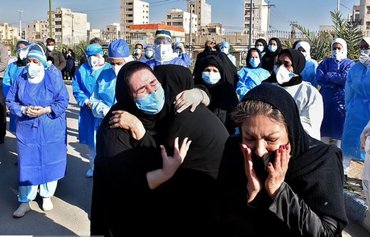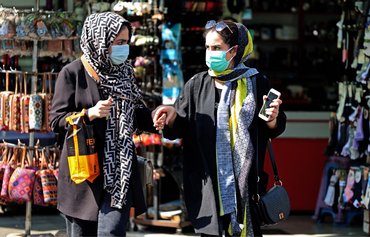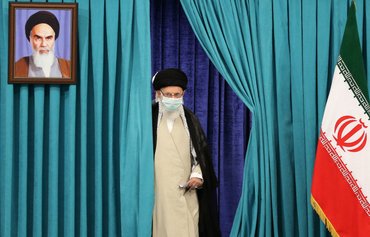While many countries are well into the process of inoculating their populations against COVID-19, Iran is lagging well behind as the regime's mismanagement and disinformation have left most Iranians susceptible to the deadly virus and its variants.
Iran has the highest number of COVID-19 infections and deaths in the Middle East. According to official data, as of June 18, over 3 million Iranians have tested positive for the virus and over 82,000 have died from it.
Experts say actual figures are considerably higher.
Despite the crisis and the risks of an even deadlier resurgence, Iranian authorities since the outbreak of the pandemic have prioritised politics over public health.
![Iran's Supreme Leader Ali Khamenei during a speech on January 8 when he announced he will block US and UK vaccines from reaching the Iranian people. [Office of the Supreme Leader]](/cnmi_di/images/2021/06/21/30417-khamenei-vaccine-600_384.jpg)
Iran's Supreme Leader Ali Khamenei during a speech on January 8 when he announced he will block US and UK vaccines from reaching the Iranian people. [Office of the Supreme Leader]
![Iranians, mask-clad amid the coronavirus pandemic, at Enghelab Square in the centre of Tehran on May 16. The majority of Iranians have been unable to access vaccines. [Atta Kenare/AFP]](/cnmi_di/images/2021/06/21/30418-Iran-COVID-vaccines-600_384.jpg)
Iranians, mask-clad amid the coronavirus pandemic, at Enghelab Square in the centre of Tehran on May 16. The majority of Iranians have been unable to access vaccines. [Atta Kenare/AFP]
One of the clearest examples of this was when Iranian leader Ali Khamenei in January banned the government from importing COVID-19 vaccines from the United States and United Kingdom.
On the heels of the ban, government officials said they would buy the vaccine "from a certain country", refusing to name the source for fear of backlash against the distrusted Chinese and Russian vaccines.
Even Iran's own public health officials who work as members of its COVID-19 Task Force have expressed such distrust.
Even in the thick of Iran's earlier struggles with shortages of tests and medical equipment, the United States offered aid to Iran in both areas -- an offer that was rejected.
January 8 was not the first time Khamenei publicly mentioned Western powers and the coronavirus in the same speech.
In his annual Nowruz (Iranian new year) address in March 2020, Khamenei implied that the United States may have manufactured the virus.
In the early stages of the pandemic, before it became global, the virus spread in Iran, starting in Qom, home to the country's largest and most significant seminary.
Regime officials hid the outbreak in Qom, allowing the virus to spread to the entire country while they worked on a disinformation campaign consisting of three pillars: denial, deception and dishonesty.
The Iranian government meanwhile continued to allow flights to and from China -- the known origin of the virus.
After a growing death toll forced the Iranian government to acknowledge the outbreak, officials began to lie about the number of hospitalisations and deaths.
Lies and more lies
False regime-fabricated rumours have been circulating in Iran in an all-too-familiar process of psychological war and brainwashing.
After the development of multiple vaccines in the West, the regime falsely claimed it cannot access them because of sanctions, even as the United Nations' COVID-19 Vaccines Global Access (COVAX) allocated 4,216,800 doses to Iran.
Moreover, the US Treasury Department's Office of Foreign Assets Control (OFAC) announced that vaccines are exempt from sanctions on Iran.
Iranian regime officials kept changing their narrative on purchasing vaccines through COVAX, even contradicting each other.
At one point, officials even stated that Iranian airplanes lacked the capability of keeping the Pfizer or Moderna vaccines at the required low temperatures, claiming that they would not survive the route to Iran.
That claim was denied by transportation officials.
Shortly after, Khamenei announced the ban on American and British vaccines, falsely accusing Western powers of attempting to "test" their manufactured vaccines on Iranians.
These actions were all orchestrated by the regime to set the scene for purchasing vaccines from China, their longtime ally, with whom they had entered a 25-year agreement that caused major uproar in the country.
China itself has admitted that there might be an efficacy problem with its vaccines.
In April, Gao Fu, head of the Chinese Centre for Disease Control and Prevention, told a conference in Chengdu that the agency was "considering how to solve the problem that the efficacy of existing vaccines is not high", local media reported.
Vaccination lagging
Iran's Health Ministry on June 18 announced that just 4,369,039 Iranians have received the first dose of their vaccine, and only 895,152 individuals have gotten the second dose.
Desperate to get vaccinated, frustrated Iranians are left with no choice but to accept any vaccines that their regime allows in the country, as they grapple with immense financial pressure and high rates of unemployment.
Official numbers, which are consistently lower than real figures, show that as of late May, at least 1.4 million Iranians remained unemployed due to the coronavirus crisis.
Iran has purchased and imported vaccines from China and Russia, with the Chinese vaccine being the most predominant.
In May alone, some two million doses of the Chinese vaccine were exported to Iran.
Even so, as of mid-June, most of the population has yet to be vaccinated. A large number of senior citizens have only received one dose of the vaccine and are now told that the second dose is unavailable until further notice.
Iranian government authorities say "friendly countries" that have sold vaccines to the Iranian government have failed to "deliver on their promise" despite having received the payments.
Lost lives are leaders' gains
Meanwhile, the Islamic Revolutionary Guard Corps (IRGC), which has a near-monopoly on Iran's economy with Khamenei's staunch support, is set to make major financial gains.
Last month, the Rouhani government allowed the private sector to import COVID-19 vaccines. The so-called private sector, however, really comprises companies linked to the IRGC or princelings with close ties to Khamenei.
Meanwhile, Iran's Health Ministry is in the process of manufacturing its own vaccine, scientific details of which are sparce.
On June 13, Iranian Health Minister Saeed Namaki announced that human trials for Iran's vaccine, COVIran Barekat, is complete, and as of next month, some 3 million doses would be produced each week.
Ninety percent of Barekat Pharmaceuticals is owned by the Executive Headquarters of Imam [Khomeini]'s Directive.
COVIran Barekat was developed in laboratories of the Executive Headquarters of Imam [Khomeini]'s Directive, a multi-million dollar corporation under the auspices of the Guardianship of the Jurist, founded by Rouhollah Khomeini shortly after the 1979 Islamic Revolution.
Regime officials have repeatedly stated that they are in the process of developing eight different COVID-19 vaccines, one of them in partnership with Cuba, but details and data about related operations are murky.
Misplaced priorities
While the public health crisis rages, the regime has chosen to spend its dwindling resources on the IRGC and its regional proxies, including the Lebanese Hizbullah, Iraqi militias and the Houthis in Yemen.
A recently leaked audio file of an interview with Iranian Foreign Minister Javad Zarif provides further proof of the regime's misplaced priorities.
In the file, widely published on April 25, the foreign minister is heard admitting to the outsized role of the IRGC and its Quds Force in Iran's foreign policy.
The Islamic Republic prioritises its regional presence and expansionist policies over diplomacy, Zarif repeatedly stressed in the interview.
The regime is also pushing forward with further violations of the landmark nuclear deal with world powers, with the UN in May voicing concern over Iran's undeclared nuclear activity and its enriched uranium stockpile that was 16 times over the allowed limit.

![Iranians, wearing protective masks amid the COVID-19 pandemic, ride a bus in Tehran on May 28. Vaccines remain inaccessible to the majority of the population. [AFP]](/cnmi_di/images/2021/06/21/30416-Iran-COVID-19-600_384.jpg)






